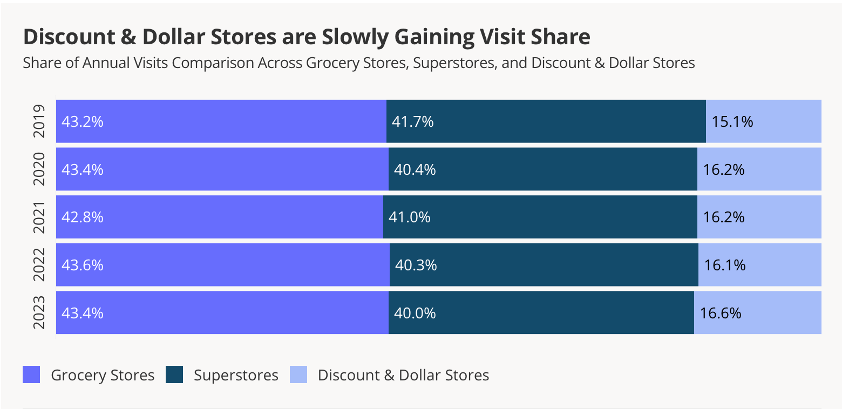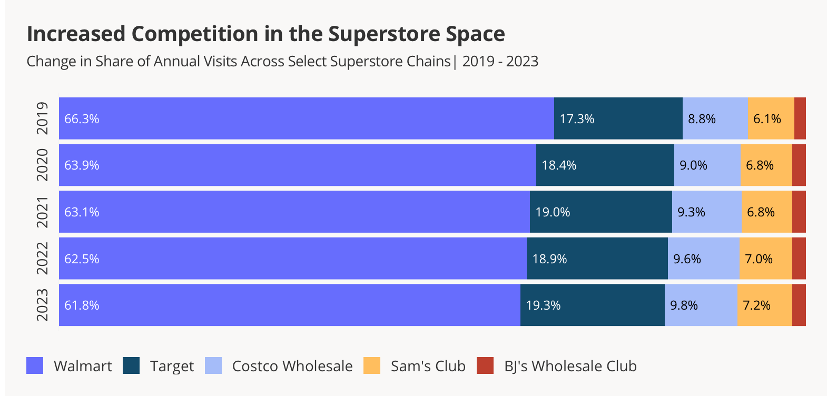2024 Consumer Trends Impacting Retail

Thanks to COVID and inflation, retail has undergone significant transformations over the last few years, impacting consumer preferences and behaviors. Whether it is dining or shopping trends, the retail landscape is constantly evolving, that has been especially true in 2024. Placer.ai recently published a white paper titled, 'Meeting 2024’s Consumer,' that explores consumer trends and behaviors in 2024 and how that is impacting retail overall.
One particular trend that stood out in this report amidst the tumultuous retail landscape has been the rise of Discount & Dollar Stores. Pre-pandemic expansion initiatives by industry leaders, like Dollar General and Dollar Tree, laid a strong foundation, positioning these essential retailers as an affordable and reliable option during the initial stages of lockdowns. While Discount & Dollar Stores were expanding their presence throughout the US, these retailers also diversified their food and drink offerings to grocery shoppers during peak stay-at-home orders. The expansion of the physical footprint of Discount & Dollar Stores, the grocery selection, and affordable prices suddenly put them in direct competition with Grocery & Superstores. Although visits to Grocery Stores and Superstores significantly outnumber visits to Discount & Dollar Stores, the rise in popularity should not be ignored.

While Discount & Dollar Stores continue to rise in popularity, the Superstore sector is forced to navigate shifting consumer preferences and behaviors. For example, with products like the Stanley Cup going viral online, Target made the decision to venture into sports merchandise with the Stanley Cup partnership, underscoring a nuanced understanding of consumer desires and trends that extend beyond the realm of essentials. Similarly, the allure of Costco and other membership clubs among affluent demographics highlights a burgeoning demand for premium offerings amidst a landscape dominated by budget-conscious consumers.
As you can see in the chart below, Costco and Target dominate the competition in the Superstore space, attracting the most affluent clientele, despite inflation and high costs of living. The success of these retail giants not only signals the presence of a consumer base willing to shop beyond basic necessities but also underscores these retailers' ability to stay adaptive and agile in an ever-changing landscape. Costco's ability to offer both premium options and affordability through bulk purchasing creates a unique capability to cater to the needs of a diverse audience, straddling the middle ground between budget-conscious shoppers and consumers who are willing to spend more on high-end foods, drinks, and products. In essence, it showcases their capacity to effectively navigate the nuances of consumer preferences, thus solidifying their position as leaders in the retail landscape.

For investors, staying attuned to these shifts isn't just about chasing the latest trends; it's about recognizing the underlying currents that drive consumer decision-making. By deciphering the evolving preferences and spending patterns of consumers, investors can identify lucrative opportunities and allocate capital strategically. Whether it's recognizing the resilience of Discount & Dollar Stores amidst economic uncertainties or discerning the growth trajectory of niche segments within the Superstore domain, these insights aim to guide investors towards informed investment decisions based on consumer patterns.
A Trusted Guide in Commercial Real Estate
Coldwell Banker Commercial® provides Commercial Real Estate Services from Property Sales and Leases, to Property Management. Learn how our expansive network of Independently Owned and Operated Affiliates and Real Estate Professionals use their in-depth knowledge of the local market and industry trends to help businesses and investors navigate the complexities of the commercial real estate landscape.






